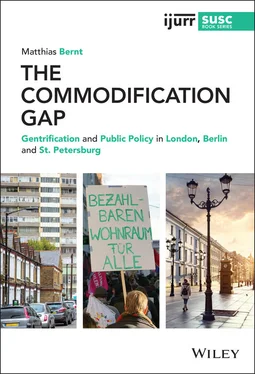1 1In a similar vein but with different language, David Ley has characterised the gentrification concept as ‘promiscuous’ and as having ‘a never‐ending appetite to include more and more areas into its study’ (presentation at the RGS‐IBG Annual International Conference 2016, ‘Planetary Gentrification’, Authors‐Meet‐Critics session, 31 August 2016, London).
2 2While the debate following Jennifer Robinson’s book Ordinary Cities (2006) has become too extensive to be repeated here, three accusations can be summarised that form the core of many postcolonial critiques (see McFarlane 2010). First, it has been argued that urban studies have been dominated by Western parochialism and it has been suggested that theories and methodologies that were developed in the West were too easily applied in settings ‘foreign’ to their place of origin. Second, there is criticism that urban studies have been marked by a tendency to study the ‘usual suspects’; without including more dissimilar contexts, the opportunity to learn from differences is severely diminished, resulting in dominating paradigms being reinforced. Third, it has been pointed out that much of the debate has been marked by a search for ‘superlative’, ‘archetypal’ and ‘paradigmatic’ cities (see Beauregard 2003; Brenner 2003), leaving little space for cities that would not fall into this realm.
3 3I acknowledge that demand‐side explanations have helped a great deal in understanding gentrification, and I also accept that supply will never be delivered without demand, so understanding the demand for inner city housing and the underlying social, demographic and cultural patterns is important. Nevertheless, I refrain from including this wing of explanations in my study. This is for two reasons. The first is that gentrification has changed since the 1970s and it has become emancipated from the ‘back to the city movements’ experienced in the USA and the UK at that moment in time. Theories developed against this background have, therefore, lost much of their former explanatory power. Providing evidence that gentrification in today’s Mumbai, Moscow or Mexico City differ from those in Islington or the Lower East Side 30 years ago hardly comes as a surprise and, as a consequence, I find the benefit of such an undertaking questionable. This is also supported by studies from the Global South, most of which show only weak interest in the Western imagination of gentrification as an influx of middle‐class professionals, artists or hipsters and their usual consumption patterns.
4 4I should emphasise that this treatment of the term excludes a number of developments that appear in the literature but, in my view, should not be counted as gentrification. Thus, an ‘incumbent upgrading’ of the social structure resulting from an improvement of the social status of sitting residents should not be counted as gentrification because it hardly involves displacement. Neither should publicly financed improvements be regarded as gentrification, as long as they are not connected to market mechanisms and undertaken for the sake of a return on the capital invested. State‐led displacement motivated by reasons other than profitability (e.g. ethnic cleansing) also stands outside this definition.
5 5Researchers from the UK or the USA clearly profit from colonial history in this regard, as they can easily do comparative studies using their native language. Unfortunately, this also supports an imbalance within urban studies in which the UK and former British colonies are extremely overrepresented both as empirical cases and with regard to their impact on wider theorisations.
Конец ознакомительного фрагмента.
Текст предоставлен ООО «ЛитРес».
Прочитайте эту книгу целиком, купив полную легальную версию на ЛитРес.
Безопасно оплатить книгу можно банковской картой Visa, MasterCard, Maestro, со счета мобильного телефона, с платежного терминала, в салоне МТС или Связной, через PayPal, WebMoney, Яндекс.Деньги, QIWI Кошелек, бонусными картами или другим удобным Вам способом.












